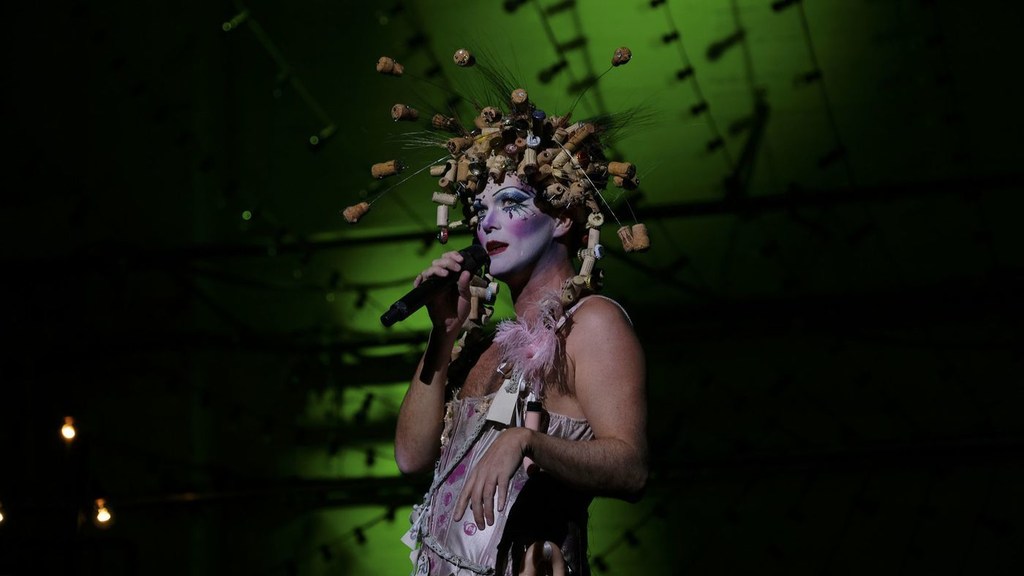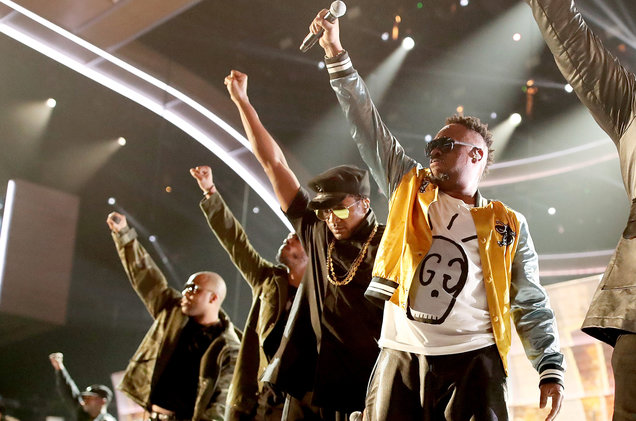music as social action :: Blog
|
I couldn't have ordered up a more fascinating capstone for the ideas and theories we've discussed in class this term. Alas, we've missed most of the shows — what a field trip this woulda been! — but be sure to read all about this. (And, hey, if you have friends at UCLA, drop everything and head up there this weekend for the final show!) Taylor Mac is a performance artist who's been creating some challenging multifaceted stage work and art for more than a decade. He won a genius grant last year, which he's apparently used to stage a 24-hour, 24-decade history of American popular music. Broken into four six-hour installments, Mac has been showcasing the width and depth of humanity's historical use of music to express, counter, and queer ideologies. He's attempting to present a history of the United States, but in concert song rather than written text or documentary film. Much of what we discussed in class is at work here — the things music can do that other texts can't, the ecstasy of a performance spectacle, perhaps even a different context for social-group cohesion. This L.A. Times article is a good summary, and check out this staid but thorough PBS report on the show ...
0 Comments
Many of you who selected the “creative” option for the course's final project — writing and recording your own protest song — are to be commended for taking the leap. A few of you said you’d never dreamed of even doing such a thing. Scary, eh? But a bracing (and educational) plunge! In the interest of walking it like I’ve been talking it, I’ll share here a protest song I wrote and recorded when I was (forgive the old-manism) about your age. During my undergrad senior year, I took it upon myself to take up the guitar. Dubbing myself THC and styling myself as some earthy nerd, I embraced the home-recording trend of the early ’90s and started making “records.” An unfortunate series of cassettes and CDs followed. The following song is from the first homemade tape, Kwitcher Bitchin (circulation appx. 32 copies). “Lip Service” attempts to make a call (on behalf of all gay men, audaciously) for less political talk, more political action — an explicit statement of the direct-action criteria we saw suggested by Denisoff on forward. That is, sure, sing your songs because of the other functions they support (group cohesion, external communication of ideology, recruitment, etc.), but eventually go do something, too. Alas, the action I'm calling for in the song is, er, indistinct. Recall that we discussed that problematic, too ... (Technical caveats: The sound’s not great, a bit distant, a digital transfer of a home-stereo recording from near-countless generations of audio technology ago. First take, flubbed chords. I was in some hurry, don'tchaknow. Lyrics take a dark turn at the end. New Dylan, I ain’t.)
As always, production thanks to David “I Should’ve Been the One to Teach Them GarageBand Basics” Zachritz South by Southwest is an annual music conference and festival — a event at which artists and their record companies can showcase themselves in a kind of one-stop shopping for the music industry and media. Todd Martens, a great critic at the L.A. Times who covers SXSW each year, posted this piece in advance of this week's five-day festival. His thesis is that SXSW this year also will be showcasing a great deal of political communication via the music.
As you read his article, note where our course theory pops up — in the way a couple of artists describe the inevitability of their writing songs of social protest given current events, in the ways artists are thinking about (and afraid of) feedback with their audiences, and in claims such as "these songs are about building a community." Participation! Why would current events seem inevitable for the production of protest songs? Setting aside personal political responses to that, think about it in terms of our course theories. Why, in an era of so many varied means of communication, would people turn to music for this type of expression? Answer with an example of a very recent protest song — why is it a particularly effective means of communication? (For sources, see this video reel of numerous recent tracks, or this piece about new protest songs.) Since our week 8 hopscotch through various musical mega-events in the 1970s and especially ’80s, several of you have asked follow-up questions about the ultimate impact (politically but also financially, which was its chief stated mission) of the Live Aid concerts in 1985.
I'll refer you to two pieces: — This media article from The Atlantic a couple of years ago is a fair retrospective of Live Aid's cultural legacy, such as how the concerts crafted a template other fundraisers have followed. — This scholarly article from a journal attempts to survey Ethiopians who would have been infants at the time of the famine (and, as we saw, such imagery was a prime motivational tool in the fundraiser's marketing) and gauge how their lives were impacted by the relief efforts. The short answer: not much. |
COMM 190
|


 RSS Feed
RSS Feed